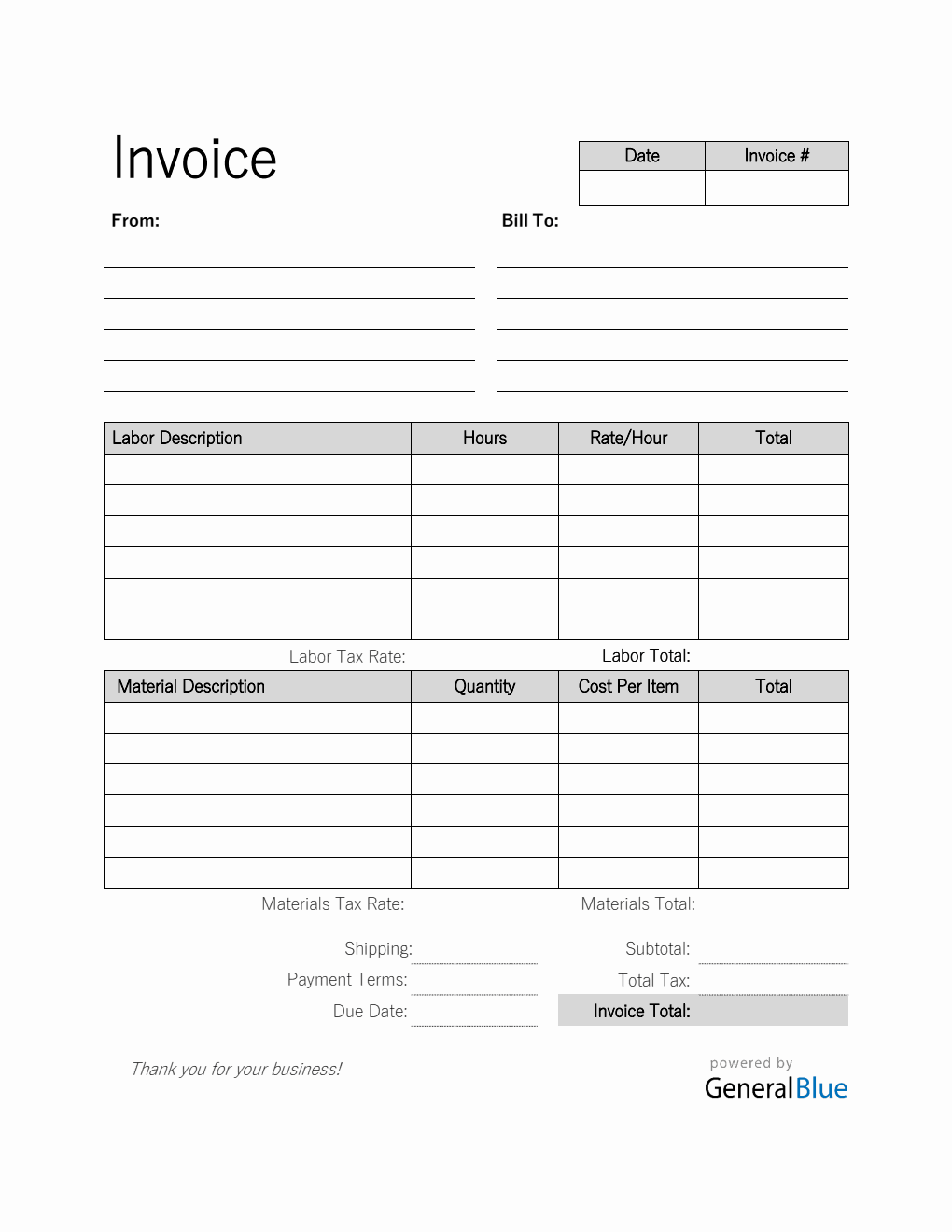Labor and Materials Invoice in Excel (Simple)
This Excel labor and materials invoice in Simple design can be used by contractors, tracking total hours of labor and cost of materials used to complete a job.
This labor and materials invoice can be used for tracking total hours of labor and cost of materials used when completing a specific service or job. It’s the perfect tool to use for contractors. This invoice is typically sent to clients/customers upon completion of the job.
To use, just fill out details on the sections provided. It includes sections for the date, invoice #, from and bill-to information, labor description, hours, rate per hour, total labor, material description, quantity, cost per item, total materials, total, subtotal, total tax, invoice total, tax rate, payment terms, and due date.
With built-in formulas, this material and labor cost calculator in Excel is very convenient to use. You don’t need to perform any manual calculations since all computations will be automatically generated for you. While there are few sections which are noneditable because of the formulas, the rest of the template are mostly customizable.
You can edit and download this Simple labor and materials form for free. It can be downloaded and edited in your phone, computer, laptop, or any other devices.
Instructions:
Fill out the date and invoice number. This is indicated at the top section of the invoice template. Here, you need to indicate the date when you will be sending the invoice as well as the invoice number for your client. The invoice number usually starts with 1 and increments over time. If you have a long-term contract with your client, it is an essential part of your invoice as it helps in tracking all invoices.
Enter your company information. Enter your company name and business address in this section. It includes the street address, city, state, zip code, and phone number.
Enter the bill-to information. Enter the name and billing address of the person or company whom the invoice should be sent to. The bill-to information includes the client’s name or company name, their address, city, state, zip code, and phone number.
Indicate the types of labor used to complete the project. Under the labor description column, indicate the types of labor used to complete the project. Each listed labor type should have its corresponding number of work hours and hourly rate entered on the same row.
Input the work hours and rate per hour for each labor type. After listing down all the labor types, enter its corresponding hours and hourly rate on the same row. Once these details are entered, the total, total labor, subtotal, and invoice total should auto-calculate.
Indicate the materials used to complete the project. Under the material description column, indicate all the materials used to complete the project. Each listed material should have its corresponding quantity and cost entered on the same row.
Input the material’s quantity and cost. After listing down all the materials used, enter its corresponding quantity and cost on the same row. Once these details are entered, the total, total materials, subtotal, and invoice total should auto-calculate.
Enter the tax rate. Enter the tax rate on the section provided. Once tax rate is entered, actual dollar amount of tax should be auto calculated. The amount generated will be automatically added in the invoice total, on top of the subtotal.
Enter the payment terms and due date. Enter the agreed payment terms between you and your client. Most common payment terms are Net 30 or Net 15. Net 30 means your client has 30 days to complete the payment, and 15 days for Net 15.
Additionally, you should also enter the due date of the invoice as this clearly defines the deadline of payments for your clients. It helps set out when payments should be made by the other party. It should be noted that your invoice date, payment terms, and due date correspond with one another. For instance, if your agreed payment terms is 15 days, then the due date should be exactly 15 days from your invoice date.







